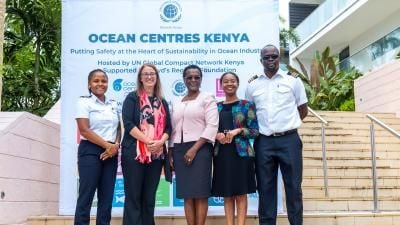The International Fund for Fishing Safety goes global – 65,000 fishers supported
The International Fund for Fishing Safety, has committed funding totaling £220,000 to support six fishing safety projects.
This page is approximately a 4 minute read
This page was published on

In a world where maritime is the lifeblood of global trade, a quiet revolution is underway - one that puts safety, sustainability, and local leadership at its heart.
Seven countries have now launched their own Ocean Centres, part of a global initiative supported by Lloyd’s Register Foundation and hosted by UN Global Compact with each tailored to national priorities but united by a shared mission: to make ocean economy growth safer, fairer, and more resilient.
The launch of the initiative at the United Nations Ocean Conference in June, has been followed by seven in-country events to bring together stakeholders from across the maritime ecosystem.
These Centres aren’t buildings - they’re networks and bring together the private sector, policymakers, investors, academics, and community leaders to tackle the safety risks that matter most in their waters. From ports and shipping to small-scale fisheries, each Centre is a reflection of local ambition and global solidarity.
In Ghana, the Ocean Centre launched with a bold theme: “Accelerating the Pace Towards a Safe and Sustainable Blue Economy.” With new legislation in place and a national strategy in the works, the Centre is already convening cross-sectoral dialogues to shape the future of fisheries, aquaculture, and marine governance.
India’s launch in New Delhi spotlighted a five-pronged approach: food, water, energy, health, and a focus on the ocean’s carbon sink abilities. Dr. M. Ravichandran, Secretary of the Ministry of Earth Sciences, called for blue bonds, ESG integration, and offshore wind investment. The Centre, led by Dr. Ravi Raj Atrey, is positioning India as a global thought leader in ocean innovation.
In the Philippines, the Ocean Centre was unveiled under the banner “LAYAG” (meaning “to sail” in Tagalog) — a rallying cry for safe and sustainable seas. With voices from MARINA, BPI, EnergiesPH, and Sinaya Seafood, the launch emphasised co-creation and community-led solutions. “Local voices must drive national and global change,” said Country Lead Yrhen Balinis.
Indonesia’s Centre, launched at Bappenas in Jakarta, is tackling safety across ports, aquaculture, and renewables. “We are not only building a stronger industry, but also a fairer and more resilient future,” said Josephine Satyono, Former Executive Director of IGCN. The Centre is already convening working groups to shape national safety recommendations.
Led by Commodore Mohammad Abdur Razzak (Retd), Bangladesh’s Ocean Centre is addressing fragmented governance and untapped marine potential. With a focus on aquaculture safety and port modernization, the Centre is helping chart a course toward more coordinated, inclusive ocean development.
In Kenya, the launch brought together coastal leaders, government officials, and maritime experts. With the blue economy employing over 500,000 Kenyans, the Centre is focused on small-scale fisheries, port operations, and disaster preparedness. “The Ocean demands that we think and act globally while responding locally,” said Hon. Francis Thoya.
The launch of Ocean Centres Brazil marked a powerful step forward in building a more connected and resilient maritime system. Hosted in Santos and co-led by the UN Global Compact Network Brazil, the event brought together voices from across shipping, ports, fishing, offshore wind, and finance - highlighting the diversity and depth of Brazil’s ocean economy.
Ruth Boumphrey, Chief Executive of Lloyd’s Register Foundation, said:
“While keeping people safe is a universal ambition, every country has its own unique ambitions to grow their maritime economies. By sharing local perspectives across the centres, we can all learn from each other”
A global network of Ocean Centres designed to put safety at the heart of the blue economy transition in emerging ocean economies.